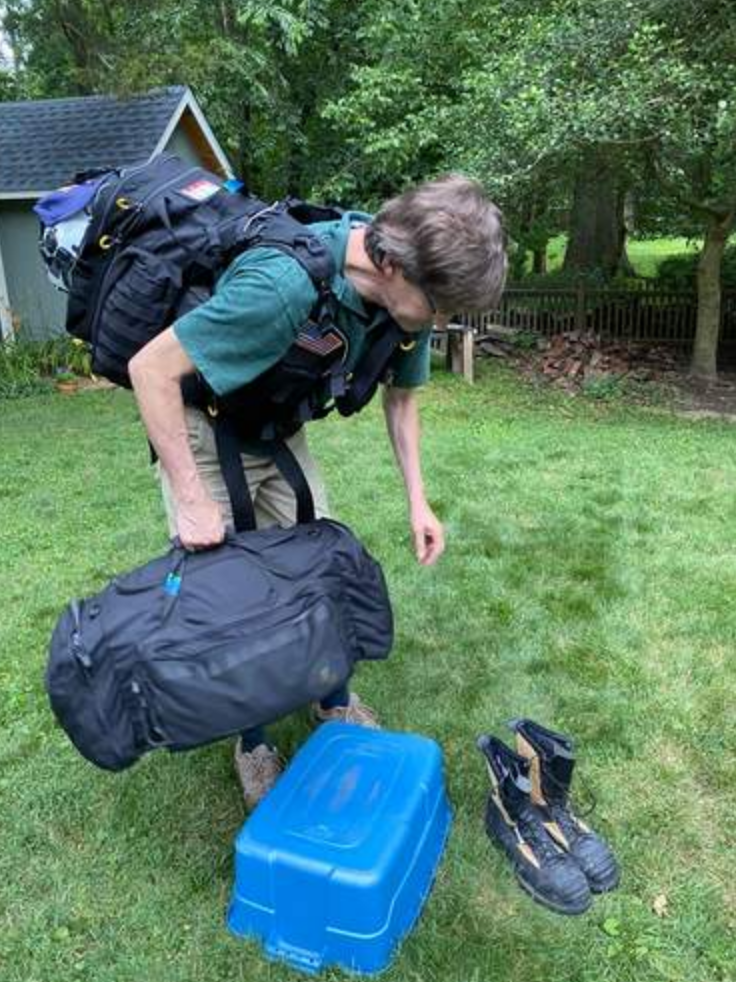My sister Anne Woodside Gribbins and I wrote this article together. Annie (pointebypointe.wordpress.com) is a former ballet dancer and project manager for Tessitura Network. She lives in Titusville, New Jersey with her husband Joe and family.
 We are sisters living in Connecticut and New Jersey. We are eight years apart and allies ever since Chris stood two feet taller than Annie while we navigated around our three noisy brothers and our charming, opinionated parents.
We are sisters living in Connecticut and New Jersey. We are eight years apart and allies ever since Chris stood two feet taller than Annie while we navigated around our three noisy brothers and our charming, opinionated parents.
Annie has noticed over the years that she can learn a lot about how bad a storm or other emergency is by watching her husband Joe, a professional firefighter and emergency medical technician, as he packs his duffel bags in their living room.
With COVID-19, he wasn’t packing bags. They were headed into this looming crisis with not one duffel bag in their living room. There was no context for dealing with global pandemics.
Many weeks into the new way of life, Chris suggested that we could pack imaginary duffel bags filled not with actual gear but with strategies we would follow to get through the rest of the pandemic. The symbolic duffel bag gives us a comforting barometer by which we can mentally prepare ourselves for how big a hurdle we might be facing.
Annie—a working parent whose 17-year-old high school junior son couldn’t play soccer the entire spring—sometimes feels she’s been practicing three-duffel-bag parenting right along.
We sketched three possible scenarios:
• The one-duffel-bag emergency: lowest level, equivalent to preparing for a tropical storm.
• The two-duffel-bag emergency: significant emergency, will take some mental preparedness, equivalent to a Category 1 hurricane.
• The three-duffel-bag emergency: highest level of preparedness, like a Category 5 hurricane.
Scenerio: One Duffel Bag
This is Chris’s one-duffel-bag scenario: The University of Connecticut, where she will be teaching, goes forward with its reopening plan. She teaches some classes on campus and some online. All of her sources of income from writing and editing continue. She and her husband Nat stay healthy. No testing is available for the asymptomatic. Society reopens and travel bans are eased, but she has to weigh carefully whether she travels, especially to visit their daughters in California and Maryland.
Here’s what goes into Chris’s first duffel bag: Masks. Careful decisions about travel. A plan to check outbreaks and her health before going anywhere. The commitment to getting enough sleep, eating well, praying, and seeking out positive people. Finally, in goes a promise: Don’t overschedule.
Annie’s one-duffel-bag scenario is this: Her son Joseph’s high school opens as currently expected. Varsity soccer practices and games proceed with precautions and a plan. Testing in her state of New Jersey ramps up to mitigate risks. Her college daughter Shannon goes back to school and can reapply to the Disney College Program internship semester in Florida she was supposed to go to this fall but which got canceled. Her husband Joe resumes his teaching commitments outside of his emergency work but does not travel for conferences. She keeps working from home with no travel for several months.
Scenario: Two Duffel Bags
Chris’s two-bag scenario: UConn decides to open later, or to add more campus restrictions. Virus cases rise slightly in the region. What goes into the second bag: Prepare and train for more online teaching and putting more of the journal I edit, Appalachia, online. Keep on top of professional skills with a business plan. Consider selling e-books and being flexible about how to sell articles. No travel the rest of the year. Stay in touch with my daughters by phone, mail, and virtually. Scope out long-term goals. End unnecessary obligations and avoid situations that make her unhappy.
Annie’s two-bag scenario: Joseph’s school operates as a hybrid of online and in-person classes. The soccer season is shortened. Shannon’s semester at college is shortened. Her husband Joe does not end up resuming all of his teaching schedule, and Annie’s travel is canceled until mid-2021.
What goes into Annie’s second bag: Make sure young Joe has the resources to cope with continued distance learning and maybe begin to frame alternate plans for post high school (gap year?). Wine. Meditation. Yoga.
Scenario: Three Duffel Bags
Chris’s three-duffel-bag scenario: UConn closes, or she loses other income sources, or her husband Nat gets a pay cut or furlough. One or both of them gets sick.
What goes into the third bag: Major pulling-in of mental energy. Stock the pantry more in case of illness. Work efficiently and well. Make herself invaluable at work. Make therapy appointments and don’t forget to show up for them.
Annie’s three-bag scenario: Joseph’s high school doesn’t open at all; all classes are online. No fall varsity sports run, so he misses out on his senior year of soccer. For Shannon, college gets put on hold. Annie does not want to contemplate the three-duffel-bag scenario.
What goes into Annie’s third bag: Therapy for all. Maybe some whisky. Definitely ice cream. Netflix suggestions, anyone? A new couch.
We laugh.
And yet Annie has learned serious lessons being married to a first responder:
1) An emergency isn’t always “your emergency.” Go into it confidently, help the person who needs help, be confident with your training, equipment, and each other.
2) Surround yourself with your “team,” good people and friends who support you. (I.e., like your sister.)
3) Have the right gear. Pull out the tools you have developed for coping that can give you the sense of calm and procedure. Firefighters don’t walk into a burning building without their gear on.
And so we aren’t going into the rest of the pandemic without our gear on. We must come out of it, live life again with the virus out there, and figure out how to do it safely. We just need our duffel bags.
On July 30, 2020, Shore Publishing posted this article here.
